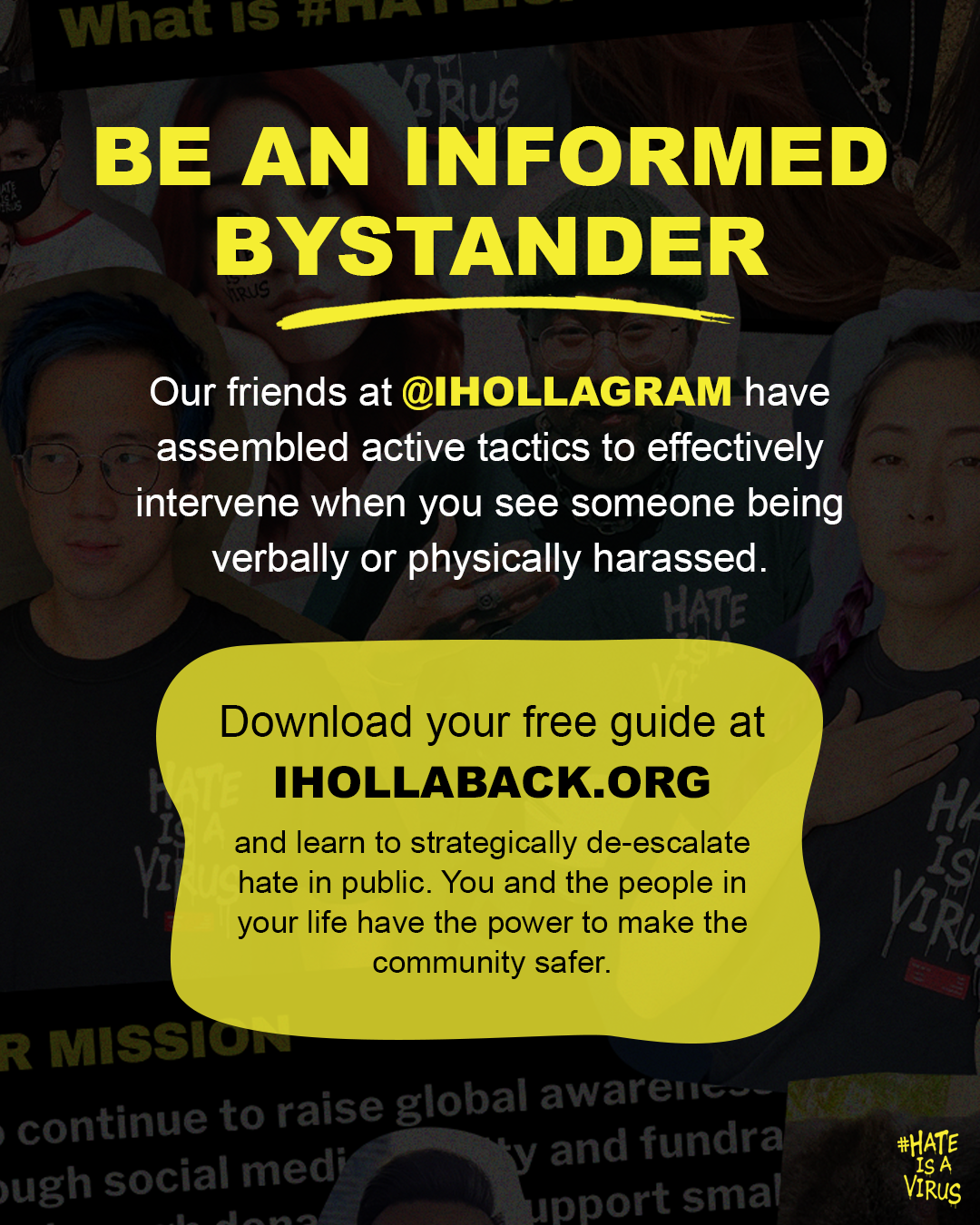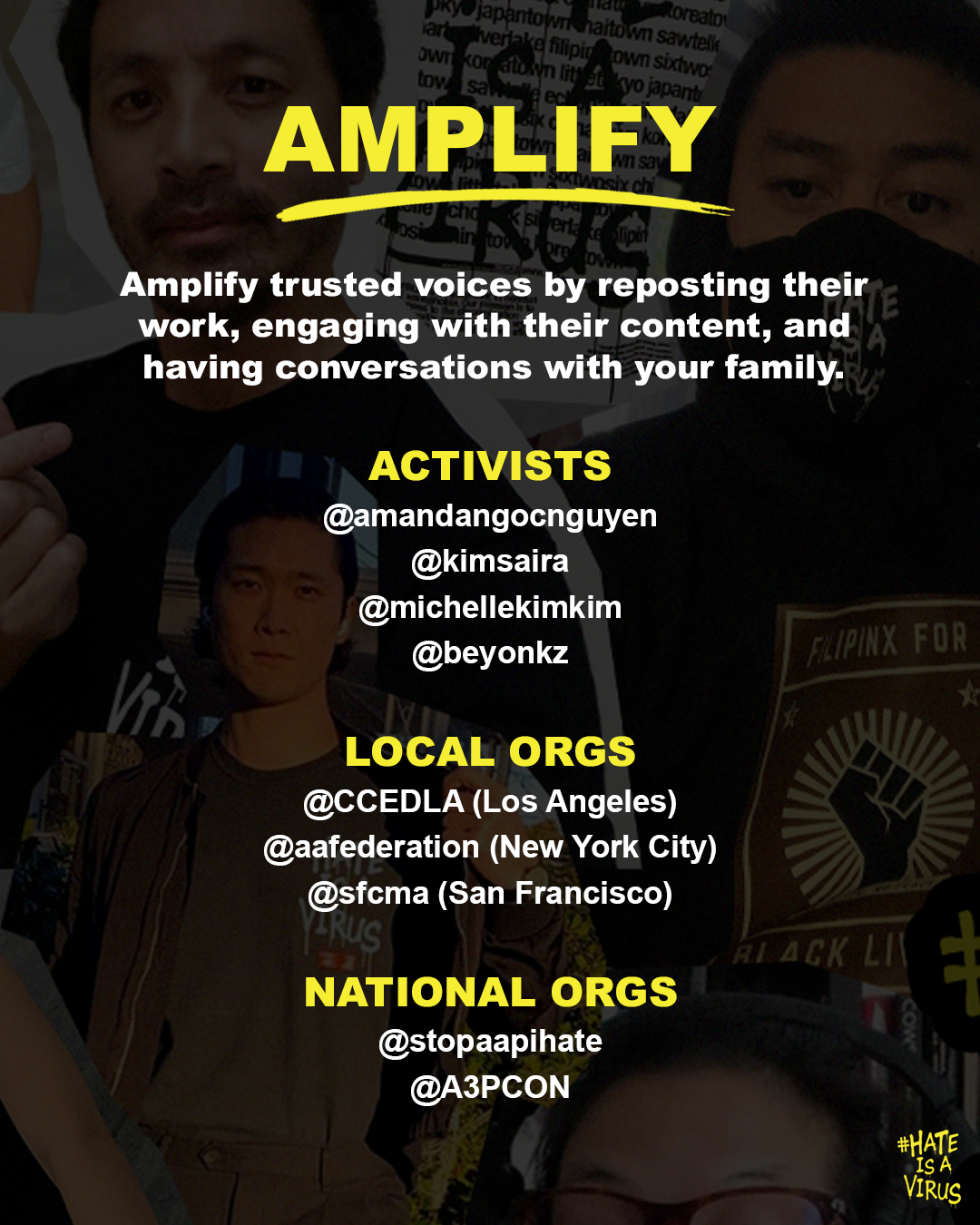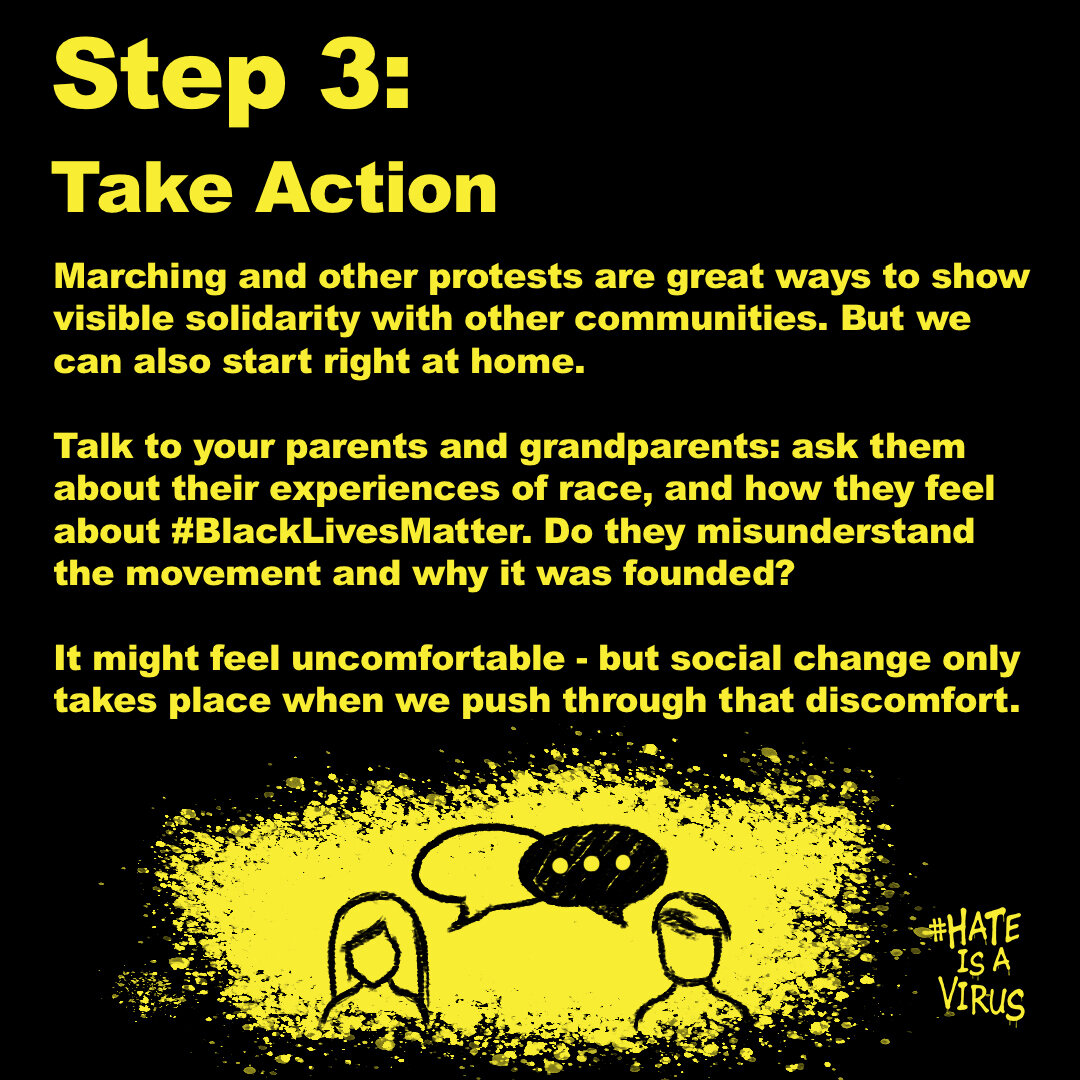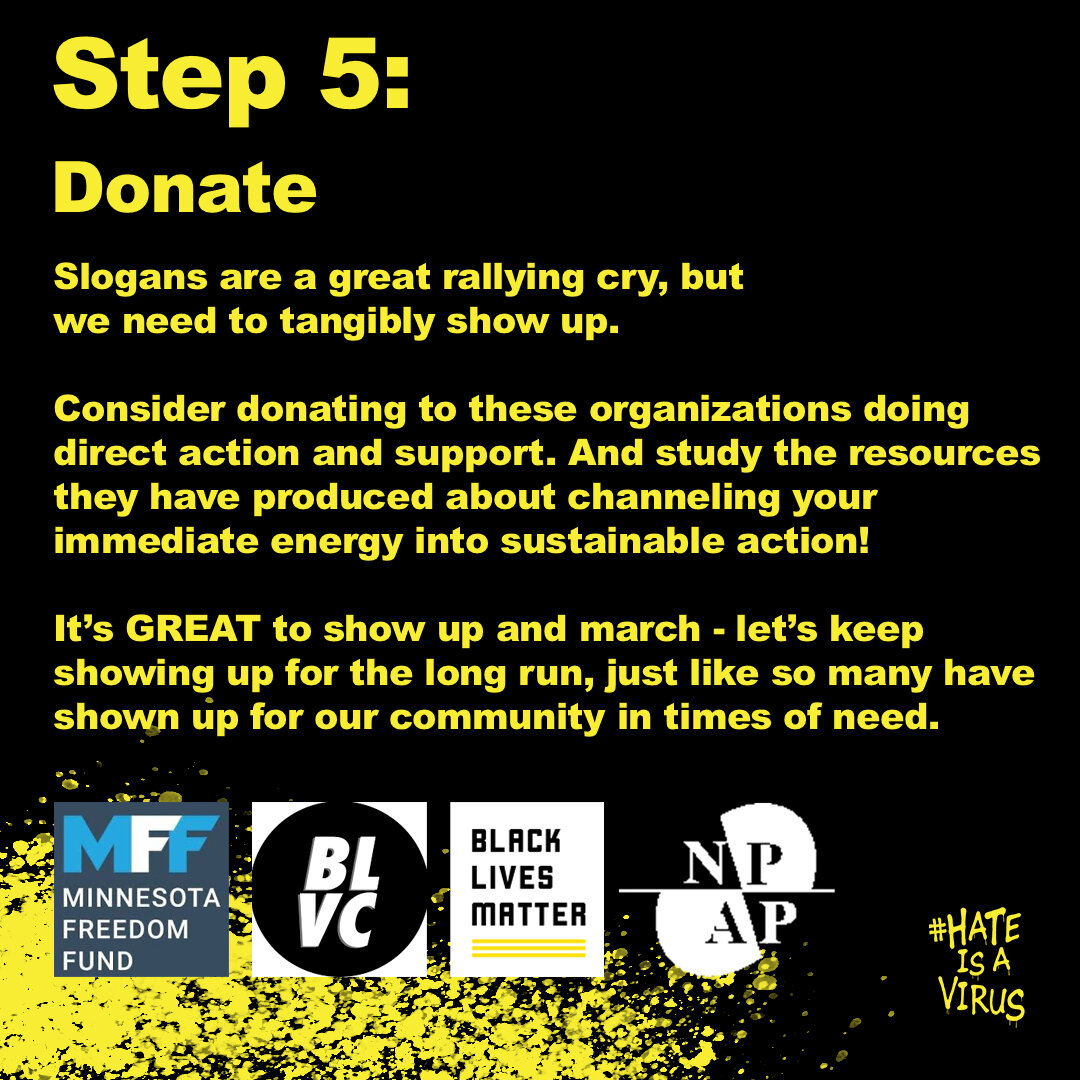How You Can Support Asian American Communities Right Now
Since the pandemic’s start, hate crimes against Asian Americans have spiked over 1900%. These incidents often target grandmothers, young children, and other vulnerable Asian Americans, yet many of these incidents have not been classified as racial hate crimes. According to Stop AAPI Hate, in the last 11 months, there were over 2,800 reports of anti-Asian hate crimes. This doesn’t even include cases that go unreported out of fear or language barriers. Here’s what you can do to take action now.
Educate
Educate yourself, friends and your family on the issues facing Asian Americans
Book Recommendations:
Minor Feelings by Cathy Park Hong
America Is In The Heart by Carlos Bulosan
No-No Boy by John Okada
Freedom Dreams by Robin D.G. Kelley
Asian Settler Colonialism by Candace Fujikane
The Making of Asian America by Erika Lee
Be An Informed Bystander
Check out Hollaback’s guide to de-escalate hate in public.
Amplify
Amplify trusted voices by reposting their work, engaging with their content, and having conversations with your family.
Activists
Local Organizations
@CCEDLA (Los Angeles)
@aafederation (New York City)
@sfcma (San Francisco)
National Organizations
Hate Is A Virus stands in active solidarity with the Black community against the social injustices — over policing, mass incarceration, job discrimination, and more — that have been going on for too long. We cannot and will not stand on the sidelines.
If you are protesting today, tomorrow, or in the future, please remember what we’re fighting for and why we’re here in the first place. Center the voices and information of trusted Black and POC activist leaders like BlackLivesMatter, BLD PWR, and Color of Change. Their clear vision, leadership, and strategy for uniting toward social change will help avoid the mistake of unnecessary chaos and indiscriminately venting frustrations. Small community businesses have suffered too much, and we need to care for these pillars of our community. Now more than ever, we need to stand together. Our cause is furthered when we build bridges of support to other communities as well. There is strength in community and making our collective voices heard together. Hate Is A Virus was formed to combat racism and xenophobia wherever they occur: in our AAPI community and beyond. If we choose to remain silent, we allow for oppression to happen and for history to repeat itself. We need to be honest with ourselves and move away from our own deep-rooted biases.
Please listen to your Black and Brown brothers and sisters, and find ways to help and support them in this difficult — and hopefully transformative — time.
Step 1: Identify the Problem
Change Starts Here: Steps for Asian Americans to Participate in #BlackLivesMatter
The Asian American community faces racism that can look and feel very different from Black and other people of color. As many of us ask how we can support #BlackLivesMatter, we first need to ask: why are we interested in this work? Are we centering our wants (“I want to feel good” “I’m a good person” “I want to change the world!”) or focusing on the voices and pain of our brothers and sisters (“Black people are suffering and dying” “Racism is tearing apart families”)?
Step 2: Listen and Educate Yourself
Asking Black or Brown friends to continually educate us about their experience is actually demanding them to do work that they may not be ready, willing, or able to do!
We can take the first step by learning from Black and Brown authors, as well as discovering the erased history of Asian Americans fighting for justice and civil rights.
Step 3: Take Action
We believe in marching and active vocal protest to use our bodies and voices to show visible solidarity with other communities.
But we can also start at home, in conversations, and elsewhere. Talk to your parents and grandparents - ask them about their experiences of race, and how they feel about #BlackLivesMatter. They may misunderstand the movement or where and why it was founded. It might feel uncomfortable at first - but social change only takes place when people are willing to push through that discomfort.
Step 4: Amplify
Learn to speak up, but also to listen!
We don’t like being ignored or dismissed when we talk about our community’s issues - let’s pay particular attention to Black women and men when it’s their community’s issues at stake.
Step 5: Donate
Step 6: Repeat all of the above daily.
FAQ
Are you a nonprofit?
While we await our 501(c)(3) status, Hate Is A Virus has created a nonprofit fund through Philanthropic Ventures Foundation (PVF) to ensure that all donations are tax-deductible and support our mission. All monetary donations will help Hate Is A Virus fund operations and initiatives that combat racism and hate.
How is #HIAV addressing the racism in the black community?
Discrimination or physical violence against Black people is NOT OK, and we will continue to loudly and clearly decry anti-Blackness in America at large, and particularly whenever it appears in Asian American communities. Members of our team are active in #AsiansForBlackLives. With that said, we believe that racism against Black and Asian Americans (not to mention Latinx and Native communities) is all grounded in the same pattern of systemic injustice - and that only when we support one another, will we be able to actively undo that system.
What can non-AAPIs do to support?
Please, speak up and stand up! When you see someone using racist terminology, using stereotypes to blame Asians for this disease, lumping all Asians together into one group ("you all look alike"/"you're all the same"), or calling Asians un-American, let them know that it's untrue, furthers hatred in our society, and does nothing to solve the outbreak. Support Asian American businesses by ordering take-out or food delivery. And if you see someone being physically harassed or intimidated, go and check in on them or practice bystander intervention techniques.
How do we respond online to racism and cyber bullying?
If you're feeling too stressed - disengage! Take a step away, breathe deeply, drink water, talk to a friend, take a nap or go for a walk. When you come back, if you feel like you have the energy to engage: stay calm. Don't try to win over someone who clearly is not interested in learning. Engage for the sake of those watching who may be undecided, or scared, or not know how to speak up for themselves. Make your points clearly, calmly, and know when to step away again.
Black people are causing the hate crimes towards Asians, why are you standing up for them?
We stand up against anti-Black racism because our struggles are ultimately against the same systems of injustice and inequality. Racism in America affects Black, Latinx, Asian, and Native communities differently, in ways that sometimes turn us against each other. But we firmly believe that individual incidents of hatred - instigated by people of ANY race - will only be solved by addressing the underlying systems of inequality that cause these racial tensions.
Are you guys going to remain silent about the discrimination of black people in China/by Asians?
We haven't been silent! Members of our team have spoken up loudly about anti-Blackness in Asian and Asian American communities, and continue to do so. But we are all Americans, and believe that the strongest impact we can have is immediately around us in our American communities.
Additional Resources:
Learn about bystander intervention training with Hollaback!
Learn about "How to Combat Anti-Asian Racism in the Age of COVID-19":
Report incidents of hatred at the Stop AAPI Hate Reporting Center AND learn more from A3PCON
#HATEISAVIRUS teamed up with Admerasia to build a platform that centralize, unify and visualize data associated with the rise of hate and violence.
Racism is Contagious is to build a data analysis dashboard that can generate real-time statistics utilizing the same backend technology used to track the global spread of COVID-19. Its mission is to bring awareness to the crisis and empower victims of hate to speak out and share their stories.














